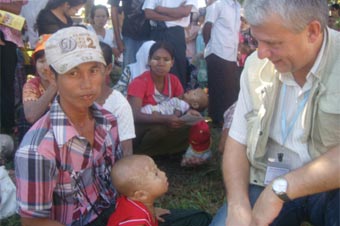Equality in vaccination and the workplace - saving girls' and boys' lives one question at a time

Dagfinn Høybråten
Board Chair of the GAVI Alliance
I believe that every single child has the right to a healthy start in life, regardless of where they live, the wealth of their family and whether they are a boy or a girl.
However, it is the last point – gender equality – that I now wish to address.
Since being appointed to the GAVI Alliance Board in 2006, I have been lucky enough to see many vaccination programmes in full swing, and one of the most moving experiences has been talking to parents after their children have been vaccinated. Basic vaccines enable families to move beyond the devastation of vaccine-preventable diseases like diarrhoea and pneumonia – the main causes of death for under-fives in low income countries - and hope for the future.

Dagfinn Høybråten in Myanmar with one of the few fathers he has met at vaccination centre. © GAVI Alliance / 2012
However, more often than not, the delighted faces at the health centres in developing countries belong to mothers, and - excited as I am to talk to these women - their overwhelming presence compared to fathers in these circumstances raises important questions. On a field visit in Myanmar last year I met one father and his son among more than a hundred mothers and their children. I commended him for his presence.
What happens if a mother has to work when the vaccination sessions are scheduled? What if there are social or cultural reasons that restrict her leaving the house without her husband or a male companion? How could fathers be more engaged in the vaccination of their children?
It is by considering questions like these that GAVI will be able to reach the 22 million children in the world who are still not receiving life-saving vaccines.
The GAVI Board approved a gender policy in 2008 with the goal of promoting increased coverage, effectiveness and efficiency of immunisation and related health services by ensuring that all girls and boys, women and men, receive equal access to these services.
The policy is a vital part of the on-going discussion about equality of access to immunisation and health services. One example of efforts to overcome gender-related barriers is Pakistan’s use of the GAVI health system strengthening grant to train 15,000 of their “Lady Health Workers” on immunisation in 38 districts. The aim was to increase access to vaccines among mothers who were uncomfortable being in contact with male vaccinators. Thanks to this initiative, children living in districts with Lady Health Workers trained by this programme are 15% more likely to have been immunised, a success rate driving the expansion of the programme to other areas of the country.
But GAVI does not just look outwards with its approach to gender. As the chair of the GAVI Alliance, I have been insisting on a good gender balance on our board. I am pleased to report that our current balance for Board members is 56 % men and 44 % women, which is in line with our gender guidelines. In addition, we have achieved gender parity on the GAVI Executive Team.
As part of our commitment to gender equality, GAVI has reviewed and is now publicly requesting feedback on the revised policy from our partners and other interested parties.
By conducting this consultation, GAVI is keeping with its tradition as a learning organisation willing to listen to advice from all those who wish to offer it. I strongly encourage anyone who cares about gender issues to read GAVI’s draft revised gender policy and contribute your ideas and feedback through the short questionnaire (now closed).
Your input can help us as we strive to reach every last child with life-saving vaccines. Thank you.
